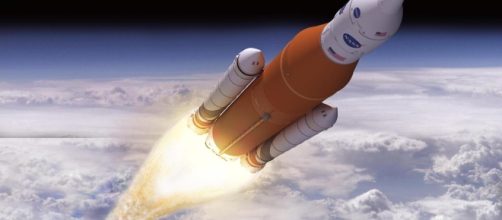According to Bloomberg, a NASA study has recommended against putting a crew on the first flight of an Orion launched on a heavy-lift space launch system rocket. The study, ordered by acting NASA Administrator Robert Lightfoot in the wake of the Trump Administration requesting a look at the scheme’s feasibility, suggests that immense scheduling and funding problems exist to execute the idea. Also, NASA is very leery about launching a new rocket with a crew on it for the first time.
Money, schedule and safety concerns cited
NASA has concluded, according to the report, that a first crewed mission to the moon would cost several hundred million dollars more than has been envisioned for the current schedule.
Also, since putting a crew on the first mission would require the development of extra hardware such as a life support system and a fully functioning abort mechanism that would propel the Orion spacecraft out of danger if something happens to the SLS during launch. Since the current schedule of hardware development involves a complex supply chain across several NASA centers, changing it to accommodate a crew on the first flight would be highly disruptive.
Launching a crew on the first flight of the SLS would be almost unprecedented. The common practice for any new launch system has been to test it without a crew first just in case something unexpected happens. The sole exception was the first flight of the space shuttle in April 1981, because testing the orbiter uncrewed turned out to be too difficult for NASA at the time.
NASA and Trump could proceed anyway
NASA and the Trump Administration has a number of options. They could ignore the report and proceed with the scheme anyway. But the decision to allocate the extra money that putting a crew on an Orion atop the SLS had to be made pretty quickly.
The development of the Space Launch System has suffered a number of setbacks, including some welding issues and an accident with the aft dome of a fuel tank. The first flight has, in any case, been delayed until 2019 with the planned 2021 crewed flight possibly delayed as well.
What about the SpaceX Falcon Heavy?
The SpaceX Falcon Heavy is waiting in the wings, with an announced plan to do its own circumlunar flight as early as 2018.
If SpaceX succeeds in pulling that off, the calls to scrap the Space Launch System are likely to get louder.
However, such a move would not meet with the approval of Sen. Richard Shelby, R-Alabama who heads the subcommittee that funds NASA in the Senate and in whose state much of the work on the SLS takes place.


